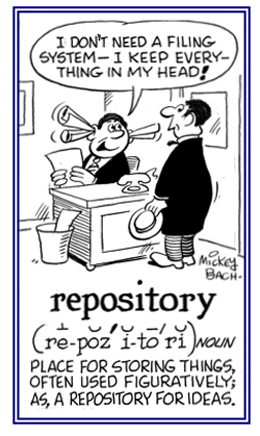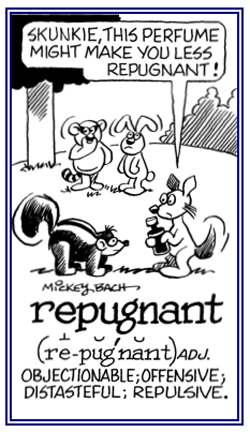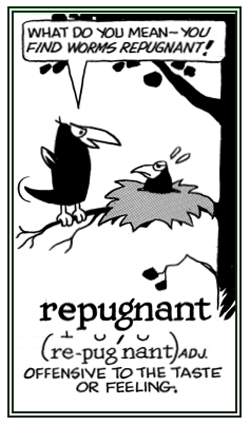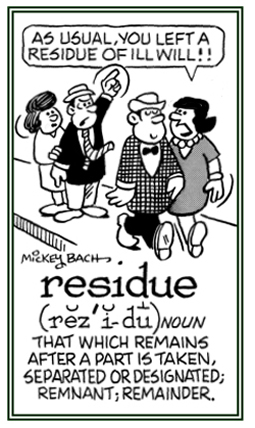re-, red-
(Latin: back, backward, again; used as a prefix)
replicate (REP li kayt") (verb), replicates; replicated; replicating
To repeat, to reproduce, or to recopy something exactly as it is or was: David, the chemist, was sure he had compiled a very important medicine and he was able to replicate it so it could be produced by a pharmaceutical company at a reasonable cost for drugstores to sell to customers.
reply
1. A presentation or an account of something, often officially, formally, or periodically: The attorney filed her report with the court before the trial started.
2. A sudden, very loud noise, that may be caused by a gun or an explosion: When walking in the forest, Ezra heard a loud report and was afraid there were hunters in the woods.
3. Etymology: from Latin reportare, "to carry back"; from re-, "back" + portare, "to carry".
2. A sudden, very loud noise, that may be caused by a gun or an explosion: When walking in the forest, Ezra heard a loud report and was afraid there were hunters in the woods.
3. Etymology: from Latin reportare, "to carry back"; from re-, "back" + portare, "to carry".
repose (verb), reposes; reposed; reposing
1. To rest or to place something somewhere: As soon as the train started to move, Carter, the salesman, reposed his head on the small pillow that he brought with him and fell asleep.
2. To place trust, hope, or confidence in something or someone: Carol has always reposed her trust in her father's judgment and she was still reposing her confidence that his advice was reliable.
2. To place trust, hope, or confidence in something or someone: Carol has always reposed her trust in her father's judgment and she was still reposing her confidence that his advice was reliable.
1. A place or container where something can be stored: The city requires a big repository for waste materials.

© ALL rights are reserved.

© ALL rights are reserved.
Go to this Word A Day Revisited Index
A vault or safe is considered to be the most secure repository for valuable possessions; such as, jewelry or money.
Some books are great repositories of knowledge and even wisdom.
2. A location where a natural resource is available: There are some countries that have repositories of salt which are being processed for human use.There are simply too many areas in the world that desperately need sufficient repositories of water for their people, animals, and all kinds of plants.
Here are a few examples of repositories: warehouses, vaults, storerooms, banks, reservoirs, libraries, museums, web sites, natural resources, etc.
3. Etymology: from Latin reposit-, "a stand on which food is stored"; from reponere, "to put away, to store"; from re-, "back, away" + ponere, "to put, to place."

Go to this Word A Day Revisited Index
so you can see more of Mickey Bach's cartoons.
1. The action or process of forming, creating, or bringing into existence again: ""There are reproductions of pictures or other works of art by means of engraving or by artists."
2. The breeding of new individuals of the same species by some form of generation: "There is a reproduction of new animal or vegetable organisms by or from existing ones."
2. The breeding of new individuals of the same species by some form of generation: "There is a reproduction of new animal or vegetable organisms by or from existing ones."
"Some manufactures are involved in the reproduction of articles of furniture, etc., in styles that existed in an earlier time."
3. The recomposition of sounds: "The reproduction of music can be done by various specialists to render different qualities for various listeners."
reproductive
1. Of the nature of, pertaining to, or effecting, reproduction; such as, producing new life or offspring.
2. Relating to the reproduction of offspring by organized bodies.
2. Relating to the reproduction of offspring by organized bodies.
reproductively
Relating to, or capable of reproduction; that is, the process by which plants and animals give rise to offspring and which fundamentally consists of the segregation of a portion of the parental body by a sexual, or an asexual, process and its subsequent growth and differentiation into a new individual.
reproductivity
A reference to producing new life or offspring; such as, the reproductivity potential of a species is its relative capacity to reproduce itself under optimal conditions; the reproductivity or regenerating of bodily organs.
repugnant (adjective), more repugnant, most repugnant
1. A reference to something that is offensive and completely unacceptable: The idea of wearing a swimsuit to a formal dinner is an example of repugnant social conduct.
2. Descriptive of something that is very disturbing and can make people feel physically repelled or disgusted: Because the changing room at the gym hadn't been aired out and six P.E. periods had taken place that day, the room had quite a repugnant odor!
3. Relating to a person who is offensive or repulsive by behaving immorally and badly: Rebecca displayed total repugnant behavior by encouraging other students to drink alcoholic beverages before school in the morning.
4. Etymology: from Latin repugnantem, repugnans and repugnare, "to fight back, to resist"; from re-, "back" + pugnare, "to fight".

© ALL rights are reserved.

© ALL rights are reserved.
Go to this Word A Day Revisited Index
2. Descriptive of something that is very disturbing and can make people feel physically repelled or disgusted: Because the changing room at the gym hadn't been aired out and six P.E. periods had taken place that day, the room had quite a repugnant odor!
3. Relating to a person who is offensive or repulsive by behaving immorally and badly: Rebecca displayed total repugnant behavior by encouraging other students to drink alcoholic beverages before school in the morning.
4. Etymology: from Latin repugnantem, repugnans and repugnare, "to fight back, to resist"; from re-, "back" + pugnare, "to fight".


Go to this Word A Day Revisited Index
so you can see more of Mickey Bach's cartoons.
repulse
reside (verb), resides; resided; residing
1. To live in a place permanently or for an extended period.
2. To be inherently present; to exist: There is a potential energy that resides when water is flowing.
3. To be vested, as a power or right: The government recognizes the authority that resides in the Supreme Court."
4. Etymology: from Old French resider, "to settle; from Latin residere, "to remain behind, to rest"; from re-, "back, again" + sedere, "to sit".
2. To be inherently present; to exist: There is a potential energy that resides when water is flowing.
3. To be vested, as a power or right: The government recognizes the authority that resides in the Supreme Court."
4. Etymology: from Old French resider, "to settle; from Latin residere, "to remain behind, to rest"; from re-, "back, again" + sedere, "to sit".
1. The place; especially, the house, in which a person lives or resides; a dwelling place; a home.
2. A structure serving as a dwelling or home; especially, one of large proportion and superior quality: Ted and Irene have a summer residence in on the California beach.
3. The act or fact of residing.
4. The act of living or staying in a specified place while performing official duties, carrying on studies or research, waiting for a divorce, etc.
5. The time during which a person lives in a place: Margaret was a residence in the neighborhood for five years.
6. The location of the main offices or principal center of business activity of a commercial enterprise; especially, a large corporation; which is registered under law.
2. A structure serving as a dwelling or home; especially, one of large proportion and superior quality: Ted and Irene have a summer residence in on the California beach.
3. The act or fact of residing.
4. The act of living or staying in a specified place while performing official duties, carrying on studies or research, waiting for a divorce, etc.
5. The time during which a person lives in a place: Margaret was a residence in the neighborhood for five years.
6. The location of the main offices or principal center of business activity of a commercial enterprise; especially, a large corporation; which is registered under law.
1. A person who lives or dwells in a place.
2. A physician who joins the medical staff of a hospital as a salaried employee for a specified period to gain advanced training; usually, in a particular field, being in full-time attendance at the hospital and often living on the premises.
3. A diplomatic representative, inferior in rank to an ambassador, living in a foreign embassy.
4. Something which is encoded and permanently available to a computer user, as a font in a printer's ROM or software on a CD-ROM.
5. A computer program that is currently active or being available in a computer memory.
2. A physician who joins the medical staff of a hospital as a salaried employee for a specified period to gain advanced training; usually, in a particular field, being in full-time attendance at the hospital and often living on the premises.
3. A diplomatic representative, inferior in rank to an ambassador, living in a foreign embassy.
4. Something which is encoded and permanently available to a computer user, as a font in a printer's ROM or software on a CD-ROM.
5. A computer program that is currently active or being available in a computer memory.
1. The remainder of something after removal of some parts or a piece: When George finished grilling the meat, the grill was covered with a greasy residue.
2. In law, the remainder of a testator's estate after all claims, debts, and bequests are satisfied: Grace left the residue of her estate to her daughter after having all the financial obligations taken care of.
3. Etymology: from Old French residu, from Latin residuum, "a remainder", from residuus, "remaining, left over", from residere, "to remain behind"; from re-, "back, again" + sedere, "to sit".

© ALL rights are reserved.
Go to this Word A Day Revisited Index
2. In law, the remainder of a testator's estate after all claims, debts, and bequests are satisfied: Grace left the residue of her estate to her daughter after having all the financial obligations taken care of.
3. Etymology: from Old French residu, from Latin residuum, "a remainder", from residuus, "remaining, left over", from residere, "to remain behind"; from re-, "back, again" + sedere, "to sit".



